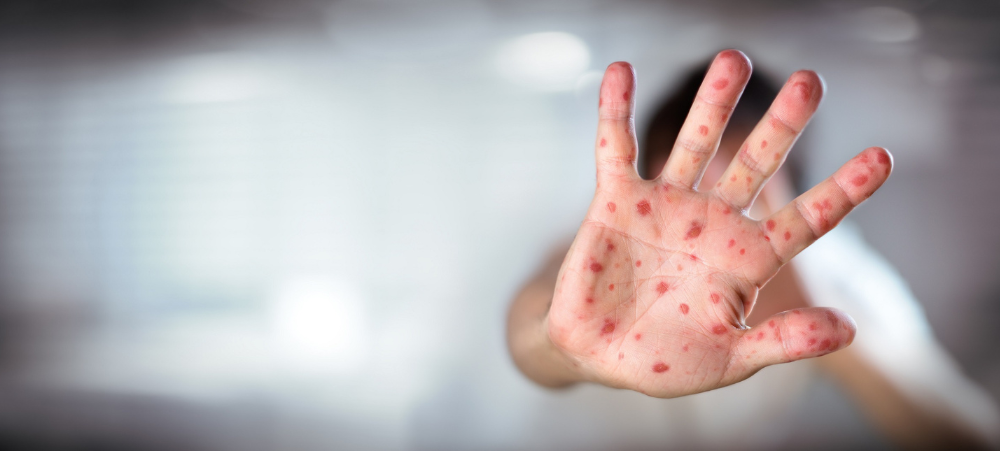The World Health Organization (WHO) has warned of an ‘alarming’ increase in measles cases – almost 45-fold in Europe last year – but outbreaks of new cases and even deaths are being reported globally. WHO believe this is a result of fewer children being vaccinated against the disease, especially during the Covid pandemic.
However, measles is preventable, thanks to a vaccine that was introduced in 1963. Since 2000, the measles vaccination programme has averted an estimated 57 million deaths worldwide. However, the Covid-19 pandemic disrupted global vaccination activities which, in 2021, resulted in the lowest measles-containing-vaccine first-dose (MCV1) coverage levels since 2008.
Dr Themba Hadebe, Clinical Executive at Bonitas Medical Fund takes a look at this ‘childhood’ disease to remind us about what causes it, the symptoms and why we should vaccinate.
What is measles?
Measles is caused by a virus and can affect anyone but is most common in children. It infects the respiratory tract and then spreads throughout the body. Some of the more common measles symptoms include:
- High fever
- Cough
- Runny nose
- Red, watery eyes (conjunctivitis)
- A rash all over the body (3-5 days after symptoms begin).
Complications of measles can lead to:
- Ear infections
- Diarrhoea
- Pneumonia (infection of the lungs)
- Other respiratory infections
- Encephalitis (inflammation of the brain) which occurs in about one in every 1 000 people with Measles.
- Blindness
Measles can be serious
Measles is so much more than just a fever and rash that clears up in a few days. It can cause serious health complications, especially in children under the age of 5 and adults over the age of 30. If a woman catches Measles during pregnancy, it can be dangerous for the mother and can result in her baby being born prematurely with a low birth weight.
Even with the best care, people can still die after contracting measles (1 to 3 out of 1 000 people).
Being vaccinated is the best way to prevent getting sick with measles or spreading it to other people.
Measles is contagious
Measles is easily spread through the air when an infected person coughs or sneezes. It is very contagious: One person can infect up to 9 out of 10 people around them if they are not adequately protected. In fact, an infected person can spread measles to others even before they know they have the disease – from up to four days before developing the measles rash to around four days afterwards.
The measles vaccine
The best protection against measles is the Measles-Mumps-Rubella (German Measles) (MMR) vaccine. The MMR vaccine provides long-lasting protection against all strains of measles.
Your child will need two doses of MMR vaccine for best protection:
- The first dose at between 12 and 15 months of age
- The second dose at between 4 through 6 years
The Measles-Mumps-Rubella-Varicella (MMRV) vaccine, which protects against four diseases, is also available to children from 12 months through 12 years of age.
 Treating measles
Treating measles
As measles is caused by a virus, there’s no specific medical treatment, it has to run its course. However, if your child has measles they need to drink plenty of liquids, get lots of rest and stay at home to prevent spreading the infection.
Measles outbreaks
The people most at risk during a measles outbreak are non-immune person (not vaccinated or vaccinated but did not develop immunity). Unvaccinated young children and pregnant persons are at highest risk of severe measles complications.
The fact is that measles is still common and with a break in the vaccination regime we are seeing more outbreaks. The best way to fight it and prevent it spreading is to vaccinate.
Did you know?
South Africa follows International Guidelines in providing vaccines to children. This programme is known as the Expanded Programme of Immunisation (EPI). Parents need to take responsibility to ensure their child is vaccinated on time: Not only to help protect the child against certain illnesses but also to contribute to the overall health of children in the general population.
‘Childhood vaccines are a critical part of a child’s health, they work by stimulating and teaching the immune system how to fight certain infections,’ explains Dr Hadebe. ‘Bonitas recognises this and we cover immunisation, on most plans, according to EPI up to the age of 12.’
- Neonatal jaundice, what is it and what happens if my baby is born with it? - July 7, 2025
- Smoking and pregnancy – should I quit - July 1, 2025
- Your pregnancy – a comprehensive guide - June 23, 2025


 Treating measles
Treating measles


thanks for info.